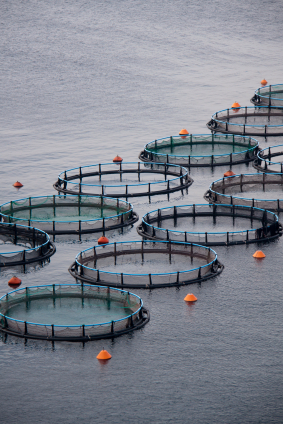Not content with the havoc they are causing on land, the likes of giant agribusinesses, Monsanto and Cargill, are now intent on taking over the seas by moving in on the fish farming, or aquaculture, sector. A report, “Factory-fed Fish: How the Soy Industry is Expanding into the Sea”, outlines the fears that accompany the plans to expand the industrial fish farming industry.
Putting profit before people – or fish
Aquaculture faces sustainability issues due to smaller, wild fish being used as a food source to produce the larger, farmed fish that we are familiar with seeing on our plates. It struggles to keep up with demand and is, overall, an inefficient industry. Don’t worry though — the mention of an additional $201 million each year in profits has piqued the interest of the money-hungry big boys and they have decided to “revolutionize sustainable agriculture”, and are hailing soy-based aquaculture feed as a sustainable alternative. And that would undoubtedly be GM soy. Sound familiar? So not content with claiming to have a solution to the world's food problems, Big Biotech reckons it has the answer to resolving the world’s fish shortage — but a sustainable answer at that!
Feeding soy to fish has already proven to produce more waste, and therefore increase the pollution load on the environment. But even more of a worry is that 93-94% of soy produced in the US today is genetically modified (GM). We are constantly being fed the line that GM can solve world hunger, but the truth is that GM poses very real risks to the environment, the animals being fed it or the people being exposed to it. In open ocean fish farming, the whole ocean is at risk of the adverse effects of GM. Some of the fish are very likely to escape and mate with wild fish and any waste, i.e. fecal matter, uneaten food and the chemicals or drugs used in these operations, is free to flow out of the cage and directly into the open sea. The ramifications of this are terrifying, and pretty much irreversible. The Food & Water Watch report reveals that, “while the soy industry stands to make large profits from the expansion of factory fish farming, there is no guarantee that soy-based aquaculture feed can consistently produce healthy fish or promote ecological responsibility.”
Taking responsibility for our resources
As the prevalence of soy in our diet increases, the benefits are being questioned, and the answers are definitely not all positive. And that's just soy – add GM soy to the mix and the risks are likely to be considerably greater – although yet to be fully elucidated. Add to this the recent link of GM to illnesses in farm pigs, mass deforestation of the rainforests to keep up with the demand for GM soy, littering the ocean, as well as the land, and increasing production of this crop paints a particularly dire picture.
As the report points out “Seafood is one of our last wild food sources". We should be doing everything we can to protect our precious seas and everything in it!
Call to action
- Read the Food & Water Watch report
- Write to your elected representatives and make your concern known
- Stay informed on this topic, and share what you know with others
- Select organically certified foods or others guaranteed to be free of GM ingredients and look for certificates of sustainability on all fish produce








Comments
your voice counts
There are currently no comments on this post.
Your voice counts
We welcome your comments and are very interested in your point of view, but we ask that you keep them relevant to the article, that they be civil and without commercial links. All comments are moderated prior to being published. We reserve the right to edit or not publish comments that we consider abusive or offensive.
There is extra content here from a third party provider. You will be unable to see this content unless you agree to allow Content Cookies. Cookie Preferences